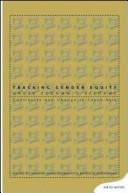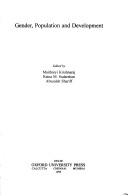| Listing 1 - 6 of 6 |
Sort by
|

ISBN: 8186706674 8186706666 1552500187 Year: 2003 Publisher: Ottawa, Ont. International Development Research Centre
Abstract | Keywords | Export | Availability | Bookmark
 Loading...
Loading...Choose an application
- Reference Manager
- EndNote
- RefWorks (Direct export to RefWorks)

ISBN: 0195642341 Year: 1998 Publisher: Delhi Oxford University Press
Abstract | Keywords | Export | Availability | Bookmark
 Loading...
Loading...Choose an application
- Reference Manager
- EndNote
- RefWorks (Direct export to RefWorks)
Aan de hand van vijftien papers wordt de positie geschetst van Indiase vrouwen, dit zowel op economisch, sociaal als cultureel vlak. De achtergrond van dit werk wordt geleverd door het verband tussen gender, ontwikkeling en demografische aspecten dat de auteurs als primordiaal beschouwen in de evoluties die de maatschappelijke positie van Indiase vrouwen in het verleden mee hebben bepaald en in de toekomst mee zullen bepalen. De papers worden in vier categorieën gegroepeerd. Een eerste categorie handelt over bevolkingspolitiek in het bijzonder. Het tweede hoofdstuk heeft discriminatie als thema. Aan bod komen onder meer de genderkloof in het onderwijs en op de arbeidsmakrt, geweld tegen vrouwen en de positie van de vrouw in het huwelijk met inbegrip van de praktijk van de bruidschat. In een derde hoofdstuk wordt de positie van Indiase vrouwen bekeken in het licht van economische ontwikkeling (bv. ontwikkeling van een exporteconomie en globalisering). In een laatste hoofdstuk tenslotte wordt nagegaan welke gevolgen de verschillende gezonheidsprogramma's die zich slechts moeizaam hebben kunnen onttrekken aan de koloniale erfenis, hebben gehad vrouw vrouwen.
Sociology of minorities --- Sociology of the family. Sociology of sexuality --- Sociology of work --- Social policy --- Demography --- Hygiene. Public health. Protection --- Gender --- Health --- Labour --- Development policy --- Government policy --- Book --- Discrimination --- India
Book
ISBN: 128242517X 9786612425172 8132103750 Year: 2003 Publisher: New Delhi ; Thousand Oaks, Calif. : Sage Publications,
Abstract | Keywords | Export | Availability | Bookmark
 Loading...
Loading...Choose an application
- Reference Manager
- EndNote
- RefWorks (Direct export to RefWorks)
This volume, the result of a creative collaboration between research and action, is aimed at highlighting the contribution of informal workers to the Indian economy. It provides a unique perspective on informal employment in India, from both a macro and a micro perspective. The contributors put forth the argument that while the informal economy already has a place in official statistics, the existing methods of data collection are inadequate to capture the actual size of this sector or to measure its significant contribution to macroeconomic aggregates. They also maintain that there is a need
Income distribution --- Informal sector (Economics) --- Labor supply
Book
ISBN: 1350221651 1780324545 1299283713 1780324537 Year: 2013 Publisher: London, England : [London, England] : Zed Books, Bloomsbury Publishing,
Abstract | Keywords | Export | Availability | Bookmark
 Loading...
Loading...Choose an application
- Reference Manager
- EndNote
- RefWorks (Direct export to RefWorks)
Women as a group have often been divided by a number of intersecting inequalities: class, race, ethnicity, caste. As individuals, often isolated in home-based work, their resistance has tended to be restricted to the traditional weapons of the weak. Organizing Women Workers in the Informal Economy explores the emergence of an alternative repertoire among women working in the growing informal sectors of the global South: the weapons of organization and mobilization.
Women --- Employment --- History.

ISBN: 8186706674 8186706666 1552500187 9786610717286 1280717289 9781552500187 9788186706664 9788186706671 Year: 2003 Publisher: Ottawa : New Delhi : International Development Research Centre ; Kali for Women,
Abstract | Keywords | Export | Availability | Bookmark
 Loading...
Loading...Choose an application
- Reference Manager
- EndNote
- RefWorks (Direct export to RefWorks)
Contributed articles on women employees in economic development process in South Asia.
Sociology of the family. Sociology of sexuality --- Economic policy and planning (general) --- South Asia --- Women in economic development --- Women employees --- Female employees --- Women workers --- Working women --- Workingwomen --- Employees --- Economic development --- Economic conditions. --- Women --- Sex discrimination against women --- Man-woman relationships --- Labor market --- Household surveys --- Gender mainstreaming --- Analysis, Gender-based --- GBA (Gender-based analysis) --- Gender-based analysis --- Gender mainstreaming in biodiversity conservation --- Mainstreaming, Gender --- Social sciences --- Sex discrimination --- Surveys, Household --- Surveys --- Census --- Market, Labor --- Supply and demand for labor --- Markets --- Female-male relationships --- Male-female relationships --- Men --- Men-women relationships --- Relationships, Man-woman --- Woman-man relationships --- Women-men relationships --- Interpersonal relations --- Mate selection --- Discrimination against women --- Subordination of women --- Women, Discrimination against --- Feminism --- Women's rights --- Male domination (Social structure) --- Social conditions --- Methodology --- Supply and demand --- Relations with women --- Relations with men --- Asia, South --- Asia, Southern --- Indian Sub-continent --- Indian Subcontinent --- Southern Asia --- Orient --- Social conditions. --- Economic policy. --- E-books
Book

ISBN: 2940503850 Year: 2017 Publisher: Genève : Graduate Institute Publications,
Abstract | Keywords | Export | Availability | Bookmark
 Loading...
Loading...Choose an application
- Reference Manager
- EndNote
- RefWorks (Direct export to RefWorks)
Partout dans le monde, des femmes et des hommes se mobilisent pour faire de l’économie autrement, une économie citoyenne qui ne soit pas au service du profit mais de l'intérêt collectif, et fondée sur la solidarité. L'économie solidaire concerne-t-elle un secteur de seconde zone, tout juste bon à panser les plaies de l’économie néolibérale ou pallier les manques d’un service public déliquescent ou inexistant ? Comment expliquer le faible intérêt, dans la littérature sur l'économie sociale et solidaire, pour le genre et les théories féministes ? Pourtant, ces initiatives sont fortement genrées et les femmes y sont souvent surreprésentées. Les activités sont marquées par des valeurs implicites de don de soi ou de sacrifice pour le bien- être de la famille, face à la crise et aux déficiences des systèmes de protection sociale. À quelles conditions trouve-t-on dans ces initiatives une opportunité de réinvention de l'économie, réencastrée dans le social et le politique et au service de la justice sociale et de genre ? Quelles sont les alternatives face à la crise de la reproduction sociale ? Peut-on repenser le politique et la démocratisation de l'économie ? L'économie solidaire peut-elle constituer une source d'émancipation pour les femmes ou est-ce que la solidarité, souvent dans des situations d'exclusion, ne fait que reproduire les mécanismes de leur propre exploitation ? Dans quelle mesure et à quelles conditions l'économie solidaire peut-elle être féministe ?
Social Sciences, Interdisciplinary --- Social Work & Social Policy --- autogestion --- besoins fondamentaux --- citoyenneté --- commerce équitable --- développement économique --- division sexuelle du travail --- économie sociale --- femmes --- histoire du genre --- mouvements alternatifs
| Listing 1 - 6 of 6 |
Sort by
|

 Search
Search Feedback
Feedback About UniCat
About UniCat  Help
Help News
News